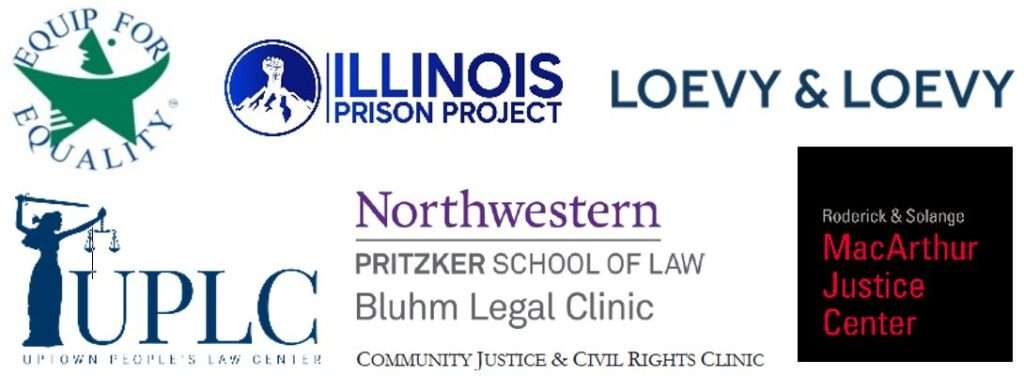Amended complaint alleges IDOC has still failed to protect medically vulnerable in Illinois’ prisons
CHICAGO, IL (May 21, 2020) – Last night, civil rights attorneys filed an amended suit in a class action case, now called Richard v. Pritzker, demanding that state officials speed the release of prisoners who are highly vulnerable to COVID-19.
Last month, a federal court recognized that thousands of people in IDOC custody are at risk for serious illness and even death if COVID-19 continues to spread though IDOC prisons. Despite this fact, the emergency request for a process that would expedite the release of those particularly at risk was denied.
Prison settings pose a particularly dangerous risk of spreading the virus with catastrophic consequences, as evidenced by the outbreak in Stateville Prison that overwhelmed the St. Joseph Medical Center in Joliet.
If IDOC does not take the proper steps to protect prisoners during the pandemic, COVID-19 will continue to devastate the prisons, as well as spread far beyond the prison system. Thousands of staff enter prisons every day, each person potentially carrying the illness into the prison or back home to their own communities. Staff may unknowingly spread the infection for weeks without showing any symptoms.
“We will continue to fight for prisoners, especially those who are particularly vulnerable to this virus. No one in Illinois has been given the death penalty, but if proper actions aren’t taken, for many this will be a death sentence,” said Alan Mills of Uptown People’s Law Center.
“Despite daily assertions that the state is making progress battling COVID-19, the governor’s office continues to ignore some of those most vulnerable to the virus,” said Vanessa del Valle, Clinical Assistant Law Professor and attorney with the MacArthur Justice Center at the Northwestern Pritzker School of Law. “We continue to hear from people in IDOC custody who, living in fear for their lives, feel forgotten by the outside world. Many are elderly, close to the end of their sentence, or have medical conditions that make COVID-19 especially deadly. This is a not a question of safety or security; but of basic human decency.”
“The IDOC imprisons many of Illinois’s most vulnerable residents, who face imminent risk of severe illness and death from COVID-19. Yet defendants refuse to provide them with the adequate hygiene, sanitation, face masks, and social distancing that we have all learned is necessary to stop the rampant spread of this deadly disease. These human beings are as deserving of protection as all other Illinois residents, and we intend to continuing fighting for them,” said Sarah Grady, an attorney at Loevy & Loevy.
“People with disabilities and serious medical conditions have been left behind in the state’s preparations, exposing them in an intolerable risk of harm. Despite promises to the contrary, the state has failed entirely to take the steps needed to protect them from COVID-19,” said Amanda Antholt, Senior Attorney at Equip for Equality.
“While people throughout Illinois prepare to relax the restrictions COVID-19 has imposed on their daily lives, Illinois’ prisoners remain squarely in the eye of the pandemic’s storm. Because of IDOC’s systemic failures they have never been provided the means to protect themselves against this lethal virus. This filing demands that Illinois prisoners most vulnerable to COVID-19 be provided access to lifesaving protective measures, and in some instances, transfer to home detention in order to stop the preventable deaths of people living behind bars,” said Sheila Bedi, director of the Community Justice and Civil Rights Clinic at the Northwestern Pritzker School of Law.
Plaintiffs are represented by the Roderick and Solange MacArthur Justice Center, the Community Justice Civil Rights Clinic at the Northwestern Pritzker School of Law, Illinois Prison Project, Uptown People’s Law Center, Loevy & Loevy Attorneys at Law and Equip for Equality, and Carolyn Shapiro, a law professor at IIT Chicago–Kent College of Law.

